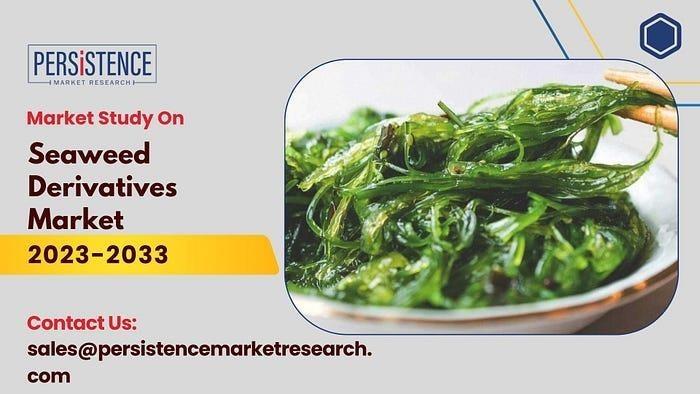Applications of Seaweed Derivatives in Food Industry
Innovative Uses of Seaweed Derivatives in Modern Food Production

The food industry has seen significant innovations over the past few decades, with one of the most intriguing being the incorporation of seaweed derivatives. Known for their versatility and health benefits, seaweed derivatives such as agar, carrageenan, and alginate have found widespread applications in various food products. The market for Seaweed Derivatives can be expected to expand at a value based CAGR of 4% and show an increase in revenue from US$ 1,767.60 Million to around US$ 2,616.47 Million by 2033.
������ ������������ �������� ������- https://www.persistencemarketresearch.com/samples/31348
(Use Corporate Mail Id for Quick Response )
In this blog post, we explore the different ways these natural ingredients are revolutionizing the food industry.
1. Thickeners and Stabilizers
One of the primary applications of seaweed derivatives in the food industry is as thickeners and stabilizers. Carrageenan, extracted from red seaweed, is widely used in dairy and meat products to improve texture and maintain consistency. It prevents separation in products like chocolate milk, yogurt, and processed meats, ensuring a smooth, appealing texture.
Agar, another seaweed derivative, is commonly used in desserts like jellies, puddings, and custards. Its strong gelling properties make it an excellent vegetarian alternative to gelatin. Agar’s ability to set at room temperature and its neutral taste make it a preferred ingredient in many sweet treats.
2. Emulsifiers in Dressings and Sauces
Seaweed derivatives also play a crucial role as emulsifiers in food products. Alginates, derived from brown seaweed, are often used in salad dressings, sauces, and mayonnaise to stabilize emulsions and prevent oil from separating from water. This application is particularly important in low-fat or reducedcalorie products, where maintaining a creamy texture without excess oil is challenging.
3. Nutritional Enhancers
Seaweed derivatives are not just about texture and stability; they also offer significant nutritional benefits. Rich in vitamins, minerals, and dietary fiber, seaweed extracts are increasingly used to fortify various food products. For example, seaweed powders are added to bread, snacks, and beverages to boost iodine content — a nutrient often lacking in modern diets. Additionally, the fiber in seaweed aids digestion and promotes gut health, making it an ideal ingredient in health-focused food products.
4. Plant-Based Food Innovations
With the rise of plant-based diets, seaweed derivatives are becoming a staple in vegan and vegetarian products. Alginates and carrageenan are used to replicate the texture of meat and dairy products without animal-derived ingredients. Vegan cheese, plant-based meat, and non-dairy ice cream often rely on these derivatives to achieve a texture and consistency that mimics their traditional counterparts.
5. Sustainable Packaging
An emerging application of seaweed derivatives is in sustainable food packaging. Seaweed-based films and coatings are being developed as biodegradable alternatives to plastic. These innovative materials can be used to package fresh produce, snacks, and ready-to-eat meals, reducing the environmental impact of food packaging.
6. Gelling Agents in Confectionery
In the confectionery industry, agar and carrageenan are popular gelling agents. They are used in the production of gummy candies, marshmallows, and other gelled sweets. These seaweed-derived ingredients provide a firm yet elastic texture, which is essential for creating the perfect bite in these products. Moreover, they are preferred over animal-based gelatin for creating vegetarian or veganfriendly confectionery.
7. Clarifying Agents in Beverages
Seaweed derivatives also play a role in the beverage industry, particularly in clarifying drinks like beer and wine. Agar and carrageenan can be used to remove impurities and clarify liquids without affecting the flavor. This application is crucial for producing clear, high-quality beverages that appeal to consumers.
Conclusion
Seaweed derivatives offer a range of applications that go beyond traditional uses. From improving food texture to enhancing nutritional content, and even contributing to sustainability efforts, these natural ingredients are proving indispensable in the modern food industry. As consumer demand for healthier, more sustainable food products continues to grow, the role of seaweed derivatives is expected to expand even further, opening up new possibilities for innovation and development in the food sector.
Whether you’re enjoying a creamy dessert, a vegan cheese, or a sustainably packaged snack, there’s a good chance that seaweed derivatives played a role in bringing that product to your table.
